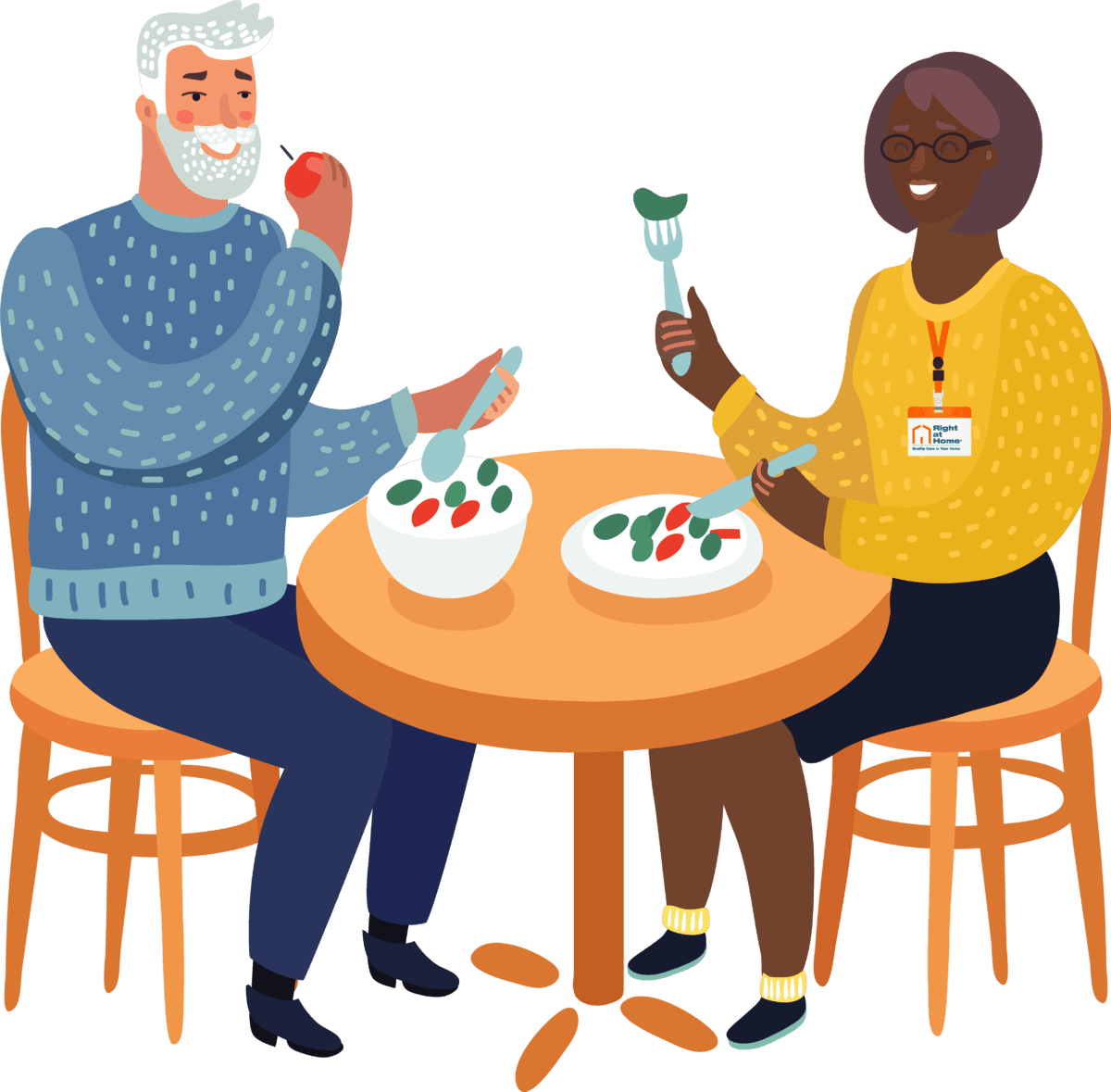Healthy Eating
Getting the right nutrition from your diet helps to keep your body performing at its best. Take a look at our top tips for maintaining a healthy diet.

- National Site
- Information & Support
- Healthy Eating
The importance of healthy eating for adults and the elderly
Good nutrition is important, no matter your age. Eating well gives you energy and can help you with weight management and physical mobility.
Maintaining a healthy diet can also help to reduce the risk of:
- Heart disease
- Osteoporosis
- High blood pressure
- Type 2 diabetes
- Certain cancers
As you age, your body and lifestyle changes. So do the nutrients you need to stay healthy:
- You may need fewer calories as you adjust to a more sedentary lifestyle and expend less energy. But, even when eating smaller portions, you still need to make sure your body absorbs necessary vitamins and minerals.
- Some older people need more protein too as the body processes protein less efficiently as we age.
- If you want to maintain muscle mass and bone health, you’ll need protein and calcium a-plenty!
The benefits of healthy eating
As well as avoiding long-term health issues, there are plenty of things to gain from eating healthily:
- May help you live longer
- Keeps skin, teeth and eyes healthy
- Boosts your immunity
- Supports muscle functions
- Strengthens bones
- Helps the digestive system to function properly
- Improves mental wellbeing
Discover the NHS guide detailing 8 tips for healthy eating, which explains exactly how much of each food group you need within your diet.
How do I make sure I am eating healthy foods?
Older adults and people living with disabilities need to remember a few simple rules to keep track of what they eat. There’s no need to count calories rigidly; you just need to be mindful of the food that you eat.
Here are some easy tips to follow to ensure you are getting everything you need from each food group:
- Focus on eating foods that are high in nutrients: fruits, vegetables, whole grains, low-fat dairy, eggs, nuts and seeds and lean meats and seafoods
- Avoid empty calories, such as crisps, sweets, fizzy drinks and alcohol
- Avoid trans and saturated fats, found in fried foods and high-fat meats
- Cook with healthier oils like olive oil
- Drink plenty of water - at least 6-8 glasses every day
Tips for those with mobility issues
If you’re looking after an elderly person with mobility issues, there are some things you can do to help without taking away their independence.
- Prepare small and easy to access snacks and meals they can choose from
- Prepare a water bottle or jug that’s easy to lift, with a drop of fruit juice in to make drinking enough more enjoyable
- Prepare watery fruits such as slices of melon and apple to help with water intake
- Make mealtimes sociable, people tend to eat more when actions are mirrored - especially those with dementia!
For healthy eating resources for people living with disabilities, contact your GP or health practitioner for medical advice.
Consider 7-day meal plans for the elderly and those living with disabilities
It can be useful to plan your meals before you shop, to make sure you have healthy meals in mind and buy the right amount for each food group. Creating a 7-day meal plan ensures you know exactly what you’re having each night. You also know that you have the ingredients in.
Meal planning is particularly beneficial for older people with memory loss or dementia, as it creates a consistent routine.
If you’re shopping for a loved one, create a meal plan together and give them a copy. Attach a list of meals for the week to the fridge, in an easy-read format. This will help to combat any memory struggles and help your loved one eat well all week.
Discover this NHS’ guide for more information on nutrition as we age. Or contact your GP for personalised advice.
Take vitamins and supplements
Ensure that your diet includes everything you need by taking vitamins and supplements. Ask your GP if they recommend adding a vitamin or mineral supplement into your daily routine.
- Calcium supports healthy bones and teeth. It also helps blood clotting and regulates normal heart rhythms and nerve functions.
- Vitamin D helps the body absorb and retain calcium and phosphorus.
- Magnesium is important for regulating muscle and nerve function, blood sugar levels and blood pressure. It also helps to make protein, bone and DNA.
- Vitamin B-12 forms red blood cells and DNA. It also aids in the development of the brain and nerve cells.
Adding vitamins and supplements into your diet is a good way to make sure that you absorb all the nutrients your body needs to function properly.
How can Right at Home help with making healthy choices?
We understand that healthy eating needs to be part of everyday life and it’s an important factor in a person’s overall wellbeing. If you are worried that a family member or a loved one is struggling with their nutrition, we can help.
Our specialised support services can help to create balanced and nourishing meals for our Clients.
Our trained CareGivers can also help with:
- Shopping for healthy foods
- Preparing meals for breakfast, lunch or dinner
- Exercising, so Clients remain active
- Medication support, including vitamins and supplements
Our CareGivers are there to ensure a high quality of life and encourage independence with their Clients.
Combine healthy eating with keeping active to keep yourself or your loved ones in good shape.
We have offices operating across England, Scotland, and Wales
;)

